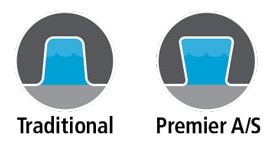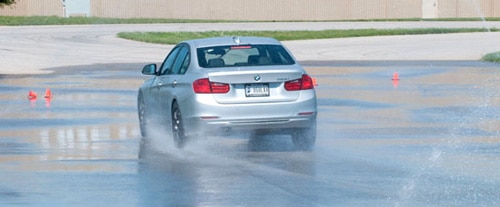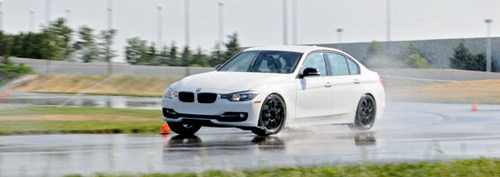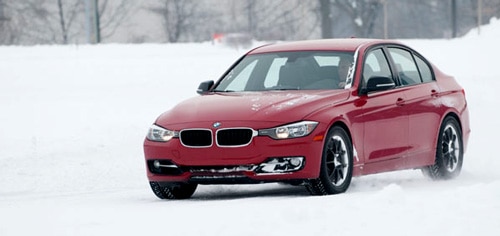November 4, 2013
When the dictionary definition for your name reads, first in position, rank or importance (in all seasons);
you’ve set a pretty high standard to be measured against. Now the question becomes, can the Premier A/S utilize
Michelin’s mastery of compound chemistry, tread design and manufacturing capabilities to become the "grandest" of
Tire Rack’s Grand Touring All-Season category tires?
In order to give Tire Rack a preview of the Premier A/S line’s capabilities before the start of our regular test
season, Michelin provided sets of early production Premier A/S tires for us to compare against its competition in
the Grand Touring All-Season tire category. However, unlike our normal practice of comparing new tires to new tires,
Michelin’s EverGrip technology meant we would also need to test tires with just 5/32" of remaining tread depth to
confirm they met their goals.
EverGrip technology
EverGrip technology combines a tread compound featuring extreme silica and sunflower oil added to the traditional
rubber and carbon black. This advanced compound is molded into a tread design featuring expanding circumferential
rain grooves and emerging lateral shoulder grooves. The combination requires unique tread compound mixing and tread
design molding processes.
Extreme silica promotes exceptional wet grip for everyday driving while sunflower
oil allows the tread compound to remain more flexible in colder temperatures. Added to rubber and carbon
black, this combination also allows Michelin to do more with less by delivering more miles of driving for every
1/32" of treadwear while they focus on delivering enhanced traction in wet and wintry conditions throughout the life
of the tire.
Expanding rain grooves reverse the traditional design process of molding the tread pattern where
the grooves continually narrow as the tire wears. Michelin’s advanced molding process allows the width of the
circumferential grooves to widen as the tire wears to maintain better wet traction longer into the tire’s life.

Emerging grooves evolve from traction-enhancing sipes early in the tire’s life into open lateral
shoulder groves as the tread wears down. These emerging grooves help maintain the land/sea relationship between
the surface contact area of new and worn tires, again maintaining better wet traction.
 Michelin promotes their Premier A/S as, "Safe When New. Safe When Worn. Even when worn, the Michelin
Premier® A/S tire still stops shorter on wet roads than leading competitors’ brand-new tires." It’s
this bold claim that would require us to confirm how much stopping traction Premier A/S delivers in wet
conditions.
Michelin promotes their Premier A/S as, "Safe When New. Safe When Worn. Even when worn, the Michelin
Premier® A/S tire still stops shorter on wet roads than leading competitors’ brand-new tires." It’s
this bold claim that would require us to confirm how much stopping traction Premier A/S delivers in wet
conditions.
In order to find out, several members of the Tire Rack team tested 215/60R16 95V-sized tires on our 2012 BMW F30
328i Sedans, comparing the new Premier A/S to the current best-in-class Grand Touring All-Season tire based on our
test results, the Continental PureContact. We put a couple hundred highway miles on sets of new tires, as well as
sets of tires shaved* to 5/32" of remaining tread depth to break them in.
Wet Braking
 We conducted our standard 50-0 mph wet braking test (which averages multiple stops) to compare the distances it
took each of the four sets of tires to brake our BMW to a complete panic stop. As shown in the results below, the
Premier A/S took a few feet longer to stop when shaved to 5/32" than when new, but both its new and worn average
stopping distances were a few feet shorter than those achieved by PureContact tires with full tread depth.
We conducted our standard 50-0 mph wet braking test (which averages multiple stops) to compare the distances it
took each of the four sets of tires to brake our BMW to a complete panic stop. As shown in the results below, the
Premier A/S took a few feet longer to stop when shaved to 5/32" than when new, but both its new and worn average
stopping distances were a few feet shorter than those achieved by PureContact tires with full tread depth.
| Stopping Distance (Feet) 50-0 mph (Lower number is better)
|
| Tires |
Michelin Premier A/S |
Continental PureContact |
| New Tread Depth |
99.8 ft. |
105.0 ft. |
| 5/32" Remaining Tread Depth |
103.5 ft. |
109.2 ft. |
Wet Skid Pad
 We then conducted our standard wet cornering test to compare how much cornering force each of the four sets of
tires would generate to hold a BMW when cornering around our 200-foot diameter skid pad. As shown in the results
below, while both tires delivered nearly equivalent cornering force when new and when shaved, the Premier A/S
average cornering forces were just a little higher than the PureContact.
We then conducted our standard wet cornering test to compare how much cornering force each of the four sets of
tires would generate to hold a BMW when cornering around our 200-foot diameter skid pad. As shown in the results
below, while both tires delivered nearly equivalent cornering force when new and when shaved, the Premier A/S
average cornering forces were just a little higher than the PureContact.
| Average Cornering (g-Force) (Higher number is better) |
| Tires |
Michelin Premier A/S |
Continental PureContact |
| New Tread Depth |
0.785g |
0.730g |
| 5/32" Remaining Tread Depth |
0.775g |
0.732g |
Snow Driving
 Thanks to the winter of 2013-2014, our final comparison was conducted in a late season snowstorm. We ran all of
the tires on our test track in South Bend and timed how many seconds it took them to complete our course. Since
good snow traction requires sufficient tread depth in addition to an appropriate tread compound and tread design,
we were interested to find out how much snow traction the reduced tread depth tires would deliver. As it turned
out, the tread design features on both tires resulted in both the full depth and tires shaved to 5/32" delivering
nearly equivalent light snow traction, with the Premier A/S having the overall advantage.
Thanks to the winter of 2013-2014, our final comparison was conducted in a late season snowstorm. We ran all of
the tires on our test track in South Bend and timed how many seconds it took them to complete our course. Since
good snow traction requires sufficient tread depth in addition to an appropriate tread compound and tread design,
we were interested to find out how much snow traction the reduced tread depth tires would deliver. As it turned
out, the tread design features on both tires resulted in both the full depth and tires shaved to 5/32" delivering
nearly equivalent light snow traction, with the Premier A/S having the overall advantage.
| Lap Time (seconds) (Lower number is better) |
| Tires |
Michelin Premier A/S |
Continental PureContact |
| New Tread Depth |
73.7 sec. |
76.3 sec. |
| 5/32" Remaining Tread Depth |
73.8 sec. |
75.9 sec. |
Summary
So what’s the answer to our question? Without a doubt, Michelin’s Premier A/S is going to challenge for the top
spot in our Grand Touring All-Season tire category.
The Tire Rack team will be running a full test on the road, on the track and in the snow. We’ll report our
complete findings as they become available.
*While shaving rather than wearing tires to 5/32" of remaining tread depth doesn’t have the exact same influence
on the tread compound wearing over several years of driving, shaving allowed us to test these tires under the same
conditions.


 Michelin promotes their Premier A/S as, "Safe When New. Safe When Worn. Even when worn, the Michelin
Premier® A/S tire still stops shorter on wet roads than leading competitors’ brand-new tires." It’s
this bold claim that would require us to confirm how much stopping traction Premier A/S delivers in wet
conditions.
Michelin promotes their Premier A/S as, "Safe When New. Safe When Worn. Even when worn, the Michelin
Premier® A/S tire still stops shorter on wet roads than leading competitors’ brand-new tires." It’s
this bold claim that would require us to confirm how much stopping traction Premier A/S delivers in wet
conditions.
 We conducted our standard 50-0 mph wet braking test (which averages multiple stops) to compare the distances it
took each of the four sets of tires to brake our BMW to a complete panic stop. As shown in the results below, the
Premier A/S took a few feet longer to stop when shaved to 5/32" than when new, but both its new and worn average
stopping distances were a few feet shorter than those achieved by PureContact tires with full tread depth.
We conducted our standard 50-0 mph wet braking test (which averages multiple stops) to compare the distances it
took each of the four sets of tires to brake our BMW to a complete panic stop. As shown in the results below, the
Premier A/S took a few feet longer to stop when shaved to 5/32" than when new, but both its new and worn average
stopping distances were a few feet shorter than those achieved by PureContact tires with full tread depth.
 We then conducted our standard wet cornering test to compare how much cornering force each of the four sets of
tires would generate to hold a BMW when cornering around our 200-foot diameter skid pad. As shown in the results
below, while both tires delivered nearly equivalent cornering force when new and when shaved, the Premier A/S
average cornering forces were just a little higher than the PureContact.
We then conducted our standard wet cornering test to compare how much cornering force each of the four sets of
tires would generate to hold a BMW when cornering around our 200-foot diameter skid pad. As shown in the results
below, while both tires delivered nearly equivalent cornering force when new and when shaved, the Premier A/S
average cornering forces were just a little higher than the PureContact.
 Thanks to the winter of 2013-2014, our final comparison was conducted in a late season snowstorm. We ran all of
the tires on our test track in South Bend and timed how many seconds it took them to complete our course. Since
good snow traction requires sufficient tread depth in addition to an appropriate tread compound and tread design,
we were interested to find out how much snow traction the reduced tread depth tires would deliver. As it turned
out, the tread design features on both tires resulted in both the full depth and tires shaved to 5/32" delivering
nearly equivalent light snow traction, with the Premier A/S having the overall advantage.
Thanks to the winter of 2013-2014, our final comparison was conducted in a late season snowstorm. We ran all of
the tires on our test track in South Bend and timed how many seconds it took them to complete our course. Since
good snow traction requires sufficient tread depth in addition to an appropriate tread compound and tread design,
we were interested to find out how much snow traction the reduced tread depth tires would deliver. As it turned
out, the tread design features on both tires resulted in both the full depth and tires shaved to 5/32" delivering
nearly equivalent light snow traction, with the Premier A/S having the overall advantage.
